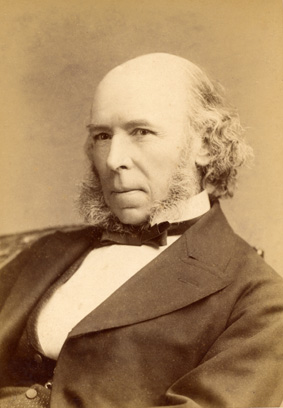Survival of the fittest facts for kids
The phrase survival of the fittest is a well-known idea from Herbert Spencer. It means that in nature, living things compete to stay alive and have babies. It's like a special way of saying something, called a metaphor. Other similar phrases are struggle for existence and natural selection, which were used by Charles Darwin. Scientists often use these short phrases to explain big ideas. These phrases are easy to remember, but it's important to understand them correctly so they aren't used in the wrong way.
Contents
Who Invented "Survival of the Fittest"?
Herbert Spencer was a British thinker who studied how things change over time, a process called evolution. He used his ideas about evolution in many areas, like how the solar system formed or how economics works.
He first used the phrase "survival of the fittest" in his book Principles of Biology. This book was published in 1864. In it, he wrote that "This survival of the fittest... is that which Mr. Darwin has called ‘natural selection’." This shows he saw his phrase as similar to Darwin's idea.
Spencer also used the phrase in another book, The Man versus the State. He used it to explain why some groups of people might not accept his ideas. He thought it was a general rule for how things work.
How Charles Darwin Used the Phrase
In his famous book, On the Origin of Species, Charles Darwin first used only the phrase natural selection. He used this phrase to compare it to artificial selection. Artificial selection is when people choose which animals or plants to breed, like farmers choosing the best crops. This was a well-known practice in England back then.
Spencer's book was the first to print the phrase "survival of the fittest." Darwin later agreed that Spencer's phrase was a good one. He thought "natural selection" made it sound like nature was a person making choices. "Survival of the fittest" avoided this problem. However, it didn't show the link between nature's choices and what breeders do.
Darwin first used "survival of the fittest" in the fifth edition of The Origin of Species. This was published in 1869. In that book, one chapter is called "Natural Selection, or the Survival of the Fittest."
Darwin gave Spencer full credit in the introduction to this fifth edition. He wrote that his own term, Natural Selection, showed how it related to human choices. But he also said that Spencer's phrase, "Survival of the Fittest," was "more accurate, and is sometimes equally convenient."
Alfred Russel Wallace Also Used It
Alfred Russel Wallace also helped discover the idea of natural selection. He also used the terms survival of the fittest and struggle for existence. He actually liked these two phrases more than "natural selection." Since both Darwin and Wallace used these terms, they were clearly helpful. They helped people understand new ideas about how living things change over time.
What "Survival of the Fittest" Means Today
Today, "survival of the fittest" is a quick way to say that not all living things in a group will have the same chance to pass on their genes. It's not about saying one thing is better than another. It's a key idea in evolution, just like natural selection.
In science, especially in population genetics, "Fitness" has a very specific meaning. It's about how well an organism can survive and reproduce. This is different from how we use "fitness" in everyday talk, like being fit from exercise.
The phrase "survival of the fittest" is used a lot outside of biology too. You might hear it in popular books or movies. People use it to talk about all kinds of competition. This includes ideas like Social Darwinism, where some people think it applies to human societies. When a phrase is used in many different ways, it's important to check if it still means the same thing as it did originally.
See also
In Spanish: Supervivencia del más apto para niños


